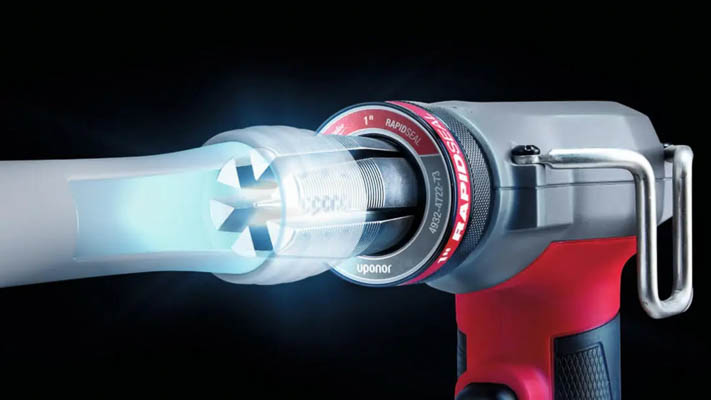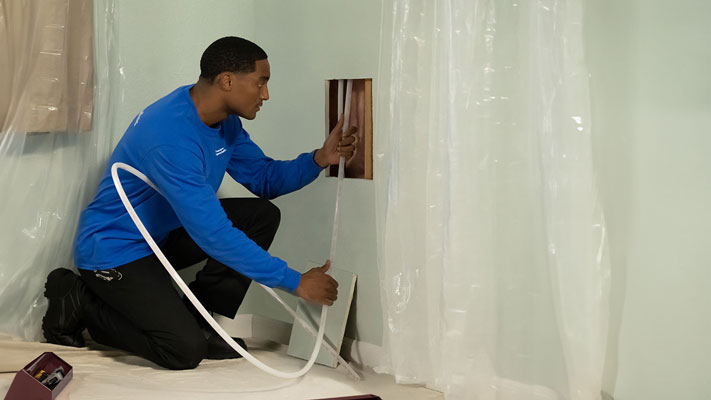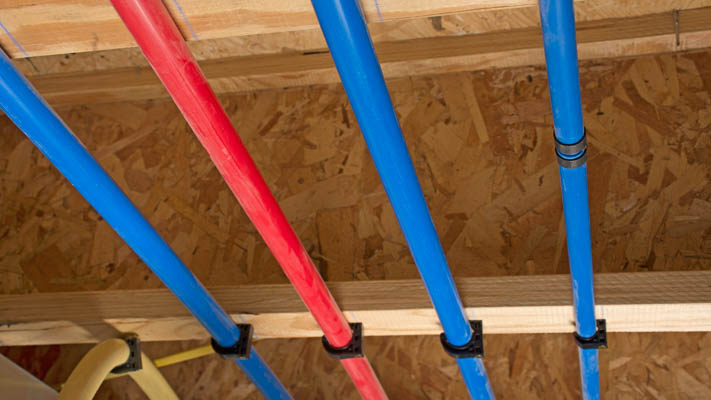What Is PEX Plumbing?
PEX, or cross-linked polyethylene, is a type of plastic piping that has become widely used in residential plumbing and repiping projects.
PEX tubing was developed in the 1960s in Europe before gaining widespread use in the United States during the 1980s and 1990s. PEX has become a popular option for homeowners due to its flexibility, durability, and cost-effectiveness.
The "cross-linking" in PEX refers to the process where individual polyethylene molecules are chemically bonded, making the pipe more durable and resistant to wear. This cross-linking can be achieved through various methods, which we will discuss further in the next section. PEX pipes are available in several types, with PEX-A being known for its superior flexibility and strength.

Compared to traditional copper pipes or outdated galvanized steel plumbing, PEX has an edge in terms of installation ease, as it can be bent easily around corners and obstacles, reducing the need for additional fittings and connectors.
What Materials Are Used to Make PEX Pipes?
PEX pipes are primarily made from high-density polyethylene (HDPE), a strong, durable thermoplastic material.
However, the real secret behind PEX's resilience lies in the process of cross-linking the polyethylene molecules. This process significantly enhances the material's strength, flexibility, and ability to withstand high temperatures and pressure.
To create PEX tubing, HDPE is mixed with a small amount of a cross-linking agent, depending on the type of PEX being produced. The three types of PEX tubing are made using distinct methods:
- PEX-A: Made using the Peroxide Method by adding a peroxide catalyst during extrusion.
- PEX-B: Made using the Silane Method by adding silane to the polyethylene.
- PEX-C: Made using the Irradiation Method by exposing the pipes to high-energy radiation.
These mixtures are then subjected to heat, initiating the chemical reaction that forms the cross-links. This process makes PEX pipes resistant to issues that often affect traditional plumbing materials, such as corrosion, scale buildup, and pitting.
While PEX pipes are primarily made from plastic materials, some versions, such as PEX-AL-PEX, incorporate layers of aluminium or other materials to improve their strength. However, these versions are rarely used in fresh water plumbing lines in homes and are more commonly found in hydronic heating systems.
Is PEX Safe for Drinking Water?
PEX tubing is safe for drinking water. The key ingredient in PEX pipes—high-density polyethylene—is non-toxic, making it an ideal material for potable water systems.
Additionally, PEX tubing is highly resistant to chemical leaching, meaning it won't contaminate your drinking water with harmful substances over time.
It's important to note that PEX complies with various regulatory standards, including those set by the NSF (National Sanitation Foundation). These standards ensure that PEX materials are safe for direct contact with potable water.
Some homeowners may have concerns about potential taste or odour issues, particularly when the piping is newly installed. These concerns typically diminish after a few days of use and do not affect the quality of a home's drinking water.
Should I Choose PEX Over Copper?
When deciding between PEX and copper for your repipe project, it's important to consider the benefits of each material. We've made it easy for you with a quick comparison of the two materials:
- Cost-Effectiveness: PEX tends to be more affordable than copper. The materials themselves are less expensive, and the ease of installation further reduces the overall cost of repiping.
- Durability and Lifespan: Both PEX and copper are durable, but PEX often has a longer expected lifespan. PEX can withstand freezing temperatures without bursting, a common issue with copper pipes.
- Flexibility and Installation: PEX is highly flexible, allowing it to bend around obstacles and reducing the need for fittings, which simplifies installation. Copper pipes, by contrast, are more rigid and require additional fittings, which can lead to potential leak points.
- Corrosion Resistance: Copper pipes are prone to corrosion over time, especially when exposed to certain minerals or water conditions. This can lead to the formation of copper pinhole leaks. PEX, being plastic, is immune to corrosion and is often preferred in areas with harsh water conditions.

Ultimately, choosing PEX over copper often comes down to cost, installation ease, and long-term reliability. While the majority of our repipes utilise Uponor PEX tubing, we also offer the option of American-made L-grade copper piping based on our clients' preferences.
If you are still unsure whether to use copper or PEX for your home repipe, feel free to contact us to schedule a free consultation with one of our local repipe consultants.
Get your free estimate today
With over 75,000 repipes completed, we've perfected our One-Stop Repipe™ for your home.
Get a Quote for Your Home PEX Repipe
Here at Repipe Specialists, we've fully replaced the plumbing in over 75,000 homes since 1991. An Uponor PEX-A repipe is not only the most cost-effective plumbing choice, but it will also save you financially into the future (we back our repipes with a lifetime warranty). We continually get positive customer feedback from customers about their overall home repipe experiences. We often exceed their expectations on:
- Speed: Our repipe crews typically complete a repipe in a day, returning on another day for wall patching.
- Convenience: Through our One-Stop Repipe™ Process, we handle everything from permits, to wall patching, to inspections.
- Cleanliness: Our crews are trained to protect your home while working (we cover all surfaces with protective sheeting), and to clean up fully at the end of each day.
- Peace of Mind: Repipe Specialists is a fully licensed plumber in every state we operate in, and we back all of our repipes with a lifetime warranty.
- Financing programs: To help take the sting out of unplanned repipe expenses, we offer several financing programs.
- Price: As a specialist that performs hundreds of repipes a week, we can deliver high quality repipes at a lower cost vs generalist plumbers. Our quotes typically range from $4,500 to $15,000 depending on the size and complexity of your project. We have an article that covers repipe cost factors in detail.
Schedule a free in-home consult, and one of our local repipe consultants will explain all your PEX repipe options and provide you with a written, fixed-price quote.

